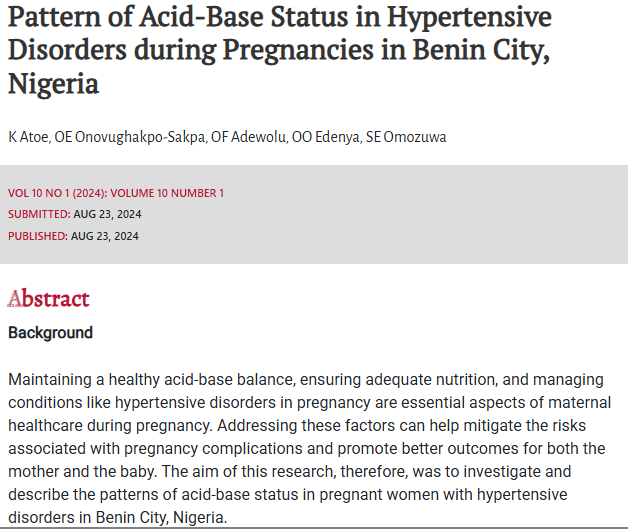Illustrative Image: May 2025: Paper of the Month by Atoe et al. 2024-Pattern of Acid-Base Status in Hypertensive Disorders during Pregnancies in Benin City, Nigeria
Image Source & Credit: IJFMI
Ownership and Usage Policy
 May 2025: Paper of the Month by Atoe et al. 2024-Pattern of Acid-Base Status in Hypertensive Disorders during Pregnancies in Benin City, Nigeria
May 2025: Paper of the Month by Atoe et al. 2024-Pattern of Acid-Base Status in Hypertensive Disorders during Pregnancies in Benin City, Nigeria
A recent study by Atoe et al. (2024) titled “Pattern of Acid-Base Status in Hypertensive Disorders during Pregnancies in Benin City, Nigeria” published in the International Journal of Forensic Medical Investigation reveals that elevated lactate dehydrogenase (LDH) may serve as a potential biomarker for detecting hypertensive disorders in pregnancy.
“
Elevated LDH levels, without corresponding lactate increases, may serve as a potential biomarker for hypertensive disorders in pregnancy.
– Atoe et al. 2024
A recent prospective case-control study conducted in Benin City, Nigeria, examined how hypertensive disorders during pregnancy—specifically preeclampsia and pregnancy-induced hypertension (PIH)—affect maternal acid-base status compared to normotensive (normal blood pressure) pregnancies. A total of 190 pregnant women were enrolled and categorized into three groups: preeclampsia, PIH, and normotensive controls. Blood samples were analyzed for plasma lactate, lactate dehydrogenase (LDH), and bicarbonate levels to assess metabolic changes linked to hypertensive conditions. The study sheds light on the biochemical patterns associated with hypertensive disorders in pregnancy, particularly the elevation of LDH without a concurrent rise in lactate levels.
Study Design and Methodology
This prospective case-control study was conducted to investigate the acid-base status of pregnant women with hypertensive disorders compared to normotensive pregnant women. The study was carried out at Central Hospital and the University of Benin Teaching Hospital, both located in Benin City, Nigeria. A total of 190 pregnant women were recruited for the study. The participants were categorised into three distinct groups: the Preeclampsia Group, Pregnancy-Induced Hypertension (PIH) Group, Normotensive Group. Inclusion criteria are pregnant women aged 20 to 40 years, singleton pregnancies, and gestational age of 28 weeks or more. However, there are also exclusion criteria, which are the presence of chronic illnesses such as diabetes mellitus, renal or hepatic disorders, thyroid dysfunction, and cardiovascular diseases. Multiple pregnancies. Participants were classified into their respective groups based on blood pressure measurements and urinalysis for proteinuria. Venous blood samples were collected via antecubital venipuncture and stored at -4°C for laboratory analysis. The following laboratory assessments were conducted: plasma lactate concentration, lactate dehydrogenase (LDH) enzyme activity, and plasma bicarbonate levels. Statistical analysis involved comparing acid-base status parameters across the three groups using analysis of variance (ANOVA) or appropriate non-parametric tests. A p-value of less than 0.05 was considered statistically significant. Informed consent was obtained from all participants prior to enrolment. The study protocol was reviewed and approved by the hospital’s Committee on Research Ethics (Reference No. ADM/E.22/A/VOL.VII/1469).
What the Authors Found
The following are the key findings of the study:
Acid-Base Profiles and Hypertensive Disorders
The study found no significant differences in plasma lactate and bicarbonate levels among women with preeclampsia, pregnancy-induced hypertension (PIH), and those with normotensive pregnancies. However, lactate dehydrogenase (LDH) enzyme levels were significantly elevated in cases of PIH, indicating potential cellular damage associated with hypertension in pregnancy.
LDH-Lactate Discrepancy
A notable and unexpected finding was the elevated LDH levels without a corresponding increase in plasma lactate. This dissociation suggests an alteration in metabolic processes in hypertensive pregnancies, where increased LDH activity does not translate into increased lactate production. This anomaly may point to underlying biochemical or physiological adaptations in response to hypertensive stress during pregnancy.
Preeclampsia Severity and BMI Effects
The study observed no significant variation in lactate, bicarbonate, or LDH levels between mild and severe preeclampsia cases. However, body mass index (BMI) appeared to influence bicarbonate levels—overweight women showed a notable decrease in bicarbonate concentrations—while LDH levels remained unaffected by BMI.
Clinical Relevance and Future Directions
Elevated LDH may serve as a potential biomarker for detecting hypertensive disorders in pregnancy. The disconnect between LDH and lactate highlights the need for further research into the metabolic mechanisms involved. Understanding this relationship could enhance diagnostic accuracy and inform better management strategies for hypertensive complications during pregnancy.
Why is this important
Early Diagnosis Through Biomarkers: The study highlights lactate dehydrogenase (LDH) as a potential early biomarker for hypertensive disorders in pregnancy, offering a promising tool for timely diagnosis and better monitoring, especially in resource-limited settings.
Deeper Insight into Metabolic Dysfunction: A key finding is the discrepancy between LDH activity and lactate levels, challenging traditional markers and improving our understanding of underlying metabolic alterations in hypertensive pregnancies.
Improved Maternal and Fetal Outcomes: By emphasising the role of acid-base balance and biochemical monitoring (e.g., LDH and bicarbonate), the study supports more targeted interventions to prevent complications like preterm birth and organ damage.
Implications for Clinical Practice and Future Research: The research opens doors to new investigations into enzyme function, lactate metabolism, and potential therapies, offering real-world impact in regions like Nigeria where maternal mortality from hypertensive disorders remains high.
What the Authors Recommended
- The authors call for further research into the metabolic anomaly observed—elevated LDH levels without a corresponding rise in lactate. They suggest exploring mechanisms such as enzyme inhibition, substrate saturation, and metabolic adaptation in hypertensive pregnancies.
- Given the significant rise in LDH in pregnancy-induced hypertension, the authors recommend clinical validation of LDH as a potential screening tool to aid in the early detection and diagnosis of hypertensive disorders in pregnancy.
- The study supports routine monitoring of acid-base markers (LDH, bicarbonate, lactate) in hypertensive pregnant women to optimize clinical management and reduce risks of maternal and fetal complications.
- The authors emphasise the importance of tailored clinical interventions based on trimester-specific metabolic changes, urging healthcare providers to adapt treatment plans in line with evolving acid-base dynamics throughout pregnancy.
- To address high maternal mortality rates—especially in countries like Nigeria—the authors advocate for policy reforms that integrate acid-base monitoring into antenatal care and promote public health campaigns to raise awareness about hypertensive pregnancy disorders.
In conclusion, the study by Atoe et al. (2024) provides critical insights into the metabolic alterations associated with hypertensive disorders in pregnancy, particularly highlighting the diagnostic potential of elevated LDH levels. The observed disconnect between LDH and lactate levels underscores the complexity of biochemical responses to hypertensive stress and calls for deeper exploration into underlying mechanisms. By advocating for the integration of acid-base monitoring into routine antenatal care, especially in high-risk regions like Nigeria, the research lays the groundwork for improved diagnostic accuracy, targeted clinical interventions, and ultimately, better maternal and fetal outcomes.
















 The African Research (AR) Index is a comprehensive scholarly directory and database focused explicitly on journal publishers that publish and disseminate African research.
The African Research (AR) Index is a comprehensive scholarly directory and database focused explicitly on journal publishers that publish and disseminate African research.

